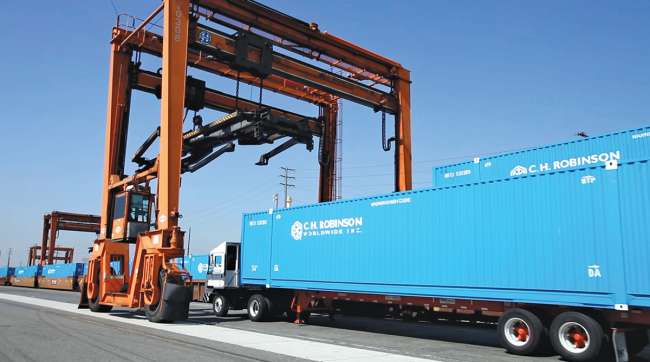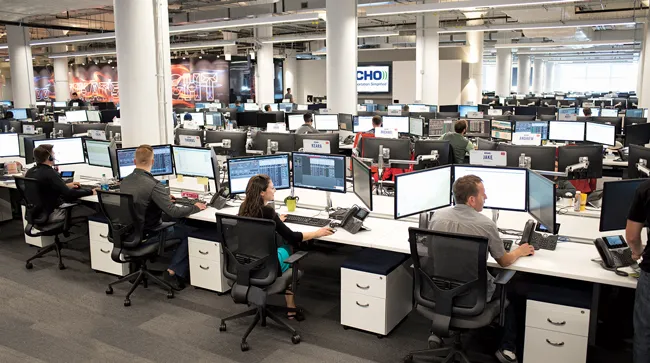Generative AI Driving Freight Brokerage Transformation

[Stay on top of transportation news: Get TTNews in your inbox.]
As much news has been made about new “tech-first” players entering the digital space of freight brokering, efforts from established and newer enterprises to develop robust digital tools are being shaped by market demands and technological innovations, including artificial intelligence, particularly generative AI, experts said.
Executives with Atlantic Logistics, C.H. Robinson, and Echo Global Logistics said technology has long been integral to their operations, and that they continuously develop and refine their systems with both proprietary and acquired software. C.H. Robinson and Echo Global Logistics rank Nos. 2 and 22, respectively, on the Transport Topics Top 100 list of the largest logistics companies in North America.
“Echo and others — the incumbents — have been digitizing for years,” Doug Waggoner, CEO of Echo Global Logistics told Transport Topics, referring to companies like J.B. Hunt and C.H. Robinson. “We have optimized our processes, from the time we give a rate quote to the time that we send an invoice to the customer, and everything in between.” J.B. Hunt ranks No. 3 on the TT Top 100 list of largest for-hire carriers in North America.
The pace and nature of digitization are changing, Waggoner and others noted. “Whereas we have done it in a proprietary fashion, now there are third-party software companies that are building tool pools that smaller brokers can use,” he said, adding that those firms are creating effective solutions. Waggoner also noted that the coming-to-market of such technologies is fueling further automation of the brokerage industry generally.

Waggoner
Brokers contend that their technological sophistication was overlooked when digital ventures entering their industry captured the spotlight. The founders of Echo Global Logistics came from a technology background, and most of the software engineers are from Google, Amazon and Microsoft, Waggoner noted.
“I just want to go on record saying that we believe we’re the original gangsters,” he jested.
Leading With Technology
Megan Orth, senior director for digital connectivity for C.H. Robinson, explained that in terms of the digitization of freight brokering, industry incumbents have been embarked on a long-term and continuing project to digitize and automate operations.
“The combined freight industry is one of evolution, rather than revolution or disruption,” she said via email. “Unlike other industries where digital startups did overtake the market, in the freight industry they came up against already well-technologized players.”
RELATED: A New Wave of AI Is Coming to Trucking
Orth noted that Airbnb was able to dominate by digitally connecting small business owners — people with B&Bs, a small inn or a room to rent. In the freight industry, companies like C.H. Robinson were digitally connecting “a vast network of carriers and shippers before technology-only freight brokers came along. It’s a common misperception that the startups invented freight tech,” Orth said. “They followed us into freight tech, not the other way around.”
Orth added that any kind of technology to make smarter decisions depends on a large dataset.

Orth
“The more data you add over time, the more the tools learn and the smarter they get,” she said. “Our Navisphere platform captures data on 19 million shipments a year.”
C.H. Robinson has automated “nearly every step in the shipping process” using generative AI,” Orth noted.
“Generative AI is used to process large volumes of data, and to create new content — translating languages, for instance, or to generate responses to email,” she said, adding that even the most tech-savvy shippers still choose to conduct business by dashing off a quick email, but that also means a human has had to read and reply to those emails. “On a single business day, we get over 11,000 emails requesting pricing on truckload freight. That’s just one kind of email.”
RELATED: AI, Analytics, Automation Drive the Development of TMS
Orth explained that C.H. Robinson technology classifies incoming email, reads it and replicates the steps a person would take to fulfill the customer’s request. The technology is used to respond to more than 2,000 email price requests a day — some days more than 3,000 — automating any transaction conducted by email.
Generative AI is also helping C.H. Robinson “unlock the value in the 500,000 pieces of unstructured data we receive daily,” Orth reported.

“Echo and others — the incumbents — have been digitizing for years,” said Doug Waggoner, CEO of Echo Global Logistics. (Echo Global Logistics)
Unstructured data, such as text documents, images, and videos, have been described as “data that doesn’t fit into neatly structured rows and columns,” making it more challenging to organize and analyze, whether by computers or people.
Reviewing the events around freight brokering, Nathan Lease, research senior director with Gartner, noted that a few years ago, digital freight networks were digital brokers wanting to revolutionize the market. He contended that the size, fragmentation and complexity of the truckload market makes it “not something that can just be revolutionized with technology.”
“They realized that the technology alone cannot change the industry, and that the digital brokerage needs to conform to the industry dynamics in order to be relevant,” Lease said.
Navigating Challenges
Lease and others referred to the current freight recession and its implications. “There’s more capacity in the marketplace,” he said, adding that the spot market has shrunk and become more competitive. Digital players have to compete head-to-head with the long-established industry enterprises, and they are adopting some of the long-standing practices of the industry, he said.
“One good example of that is digital brokers are leasing trailers and dropping them at the origin locations for pre-loads,” Lease said. “The market demanded drop trailers.”
Others also cited the role of market conditions in accelerating or slowing the progress of digitization.
RELATED: Why a Down Freight Cycle Is Ideal for Tech Investment
Ryan Schreiber, a former broker who is now chief growth officer for Metafora, a consulting firm focusing on transportation technology, said the startups bought market share, but they also provided a great proof of concept on some strategies that legacy companies have adopted.

Schreiber
“Some would say the lesson is that technology won’t solve these problems, and there has been a backlash, but those companies have been the ones that have struggled the most in the down market as well,” he said.
A strength of traditional brokers is their scalable business strategies, Schreiber said. “Their success has come from being good at sales and operating going-concern businesses,” he wrote in an email message. “That constrains their investment, but also allows them to make more intentional decisions on where to apply technology to solve problems to get return.”
Schreiber said there is a future for digital brokerage as Convoy Platform and Uber still have capacity-as-a-service products they sell to other brokers.
“It will take more time to scale digital-only brokerages,” he said. “In the near term, it looks [likely for] overly commoditized niches — point-to-point, dry, low-margin businesses—think feed and pallets, where there is high elasticity in shipping times and service levels.”

Reinke
Anne Reinke, president and CEO of the Transportation Intermediaries Association, said the optimal time for the digitization of freight is when there is very little capacity.
“We just saw that happen with the pandemic,” she said. “2021 and part of 2022 proved a heyday for carriers — a heyday for brokers too, because we were able to find that capacity.”
Reinke called digitization “a tool in the toolkit when there is little capacity,” adding that now that there is extensive capacity there is a lessening of urgency to digitize. Another factor that is slowing adoption of technology is dramatic growth of fraud, Reinke said. TIA is preparing an updated report on fraud that finds a sharp increase in cargo theft, attributable in part to criminal organizations posing as carriers, brokers, and in some cases shippers, Reinke said.
“In that kind of situation you actually want to know who you’re working with on a consistent basis to have some way to do background checks,” she said. “[Shippers and brokers] have some trepidation about using a carrier they don’t know.”
The Future of Digitalization
While the tech sector invigorated “an old-line, pretty conservative industry,” Reinke contended that there is no replacement for the old tech of relationships.
“While we are excited about what the digitization of the economy will bring to us, and [see that] digitization of freight can manifestly multiply capacity, the reason someone chooses to use a broker is typically because we have human capital that has expertise and efficiencies, that understands the best lanes, the best carriers to use, the best efficiencies to afford,” she observed, noting Uber Freight’s 2021 acquisition of Transplace as an example of that mindset.

Rob Hooper, CEO of Atlantic Logistics, said freight management technology for shippers and customers is “the future of our industry, and it’s a brilliant move for Uber to buy Transplace and be able to get into that business.”
More recently, Convoy, J.B. Hunt and Uber Freight collaborated on a project to create a standardized system for freight scheduling, and campaigned for its adoption. The project foundered last year, though the Convoy technology, designed to provide a digital marketplace, was acquired by logistics company Flexport and relaunched this year as Convoy Platform, to connect carriers with shippers and brokers.
Hooper said that this dynamic shows that IT people don’t necessarily make good freight brokers.
“[The startups] had great technology, tried to transform the industry, but they came from an IT perspective, a tech perspective, and didn’t understand how freight brokerage works,” he noted. “And that goes partly to their hubris. They lacked the industry awareness, the experience, that could have provided success.”
Want more news? Listen to today's daily briefing above or go here for more info
Nonetheless, Hooper said that there is an increase in the speed of transformation, in part due to these tech companies coming in and being existential threats to what traditional freight brokers do.
Noting that “all of us have to embrace the technology, utilize all the tech at our disposal” to be successful. Atlantic Logistics is implementing Qued, a cloud-based AI-enabled “smart workflow automation platform” designed to manage load appointment scheduling for brokers, 3PLs and carriers, Hooper said, citing it as an example of ongoing digitization, adding that Atlantic Logistics recently developed an LTL service.
“We know that’s what the future is for our industry — it’s that end-to-end [service],” he said. “The customer wants to be able to have everything met with one relationship, not five relationships: one with the railroad, one with the drayage company, one with the LTL company, one with the warehouse — they want to be able to outsource it to us and say, ‘Handle it.’ ”
Hooper concluded that the 3PL industry will be able to adapt to digitalization. “I think we’ll do just fine,” he said. “But we’re going to see compressed margins. And we can compress margins as we get more efficient.”




